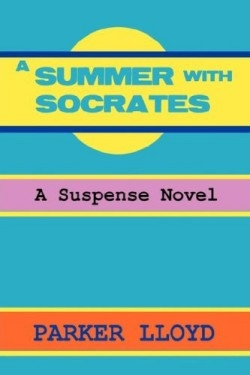A Summer With Socrates
A Suspense Novel
Reno Nevada “The Biggest Little City in the World” seems like an unlikely place to stumble upon a disciple of Socrates but that is the persona who keeps Christine Covington out of the clutches of the police.
Parker Lloyd’s heroine Christine Covington is on the lam. She has deserted an emotionally abusive husband and children grown into adolescent indifference. Christine was a debutant of the mid-twentieth-century South schooled in its WASPish mores and well-married by conventional standards but she found herself isolated in the yuppie town of McLean Virginia not allowed to work or even drive. Her novel-writing efforts which she began to bring meaning to her life are belittled by her husband Crossford.
“The truth is my dear you have absolutely no talent” he tells her. “Find something else to do.”
Armed with a an unexpected inheritance and driving lessons taken while Cross is at work Christine buys a camper van loads it with supplies and heads south and then west—south to gratify feelings of nostalgia and loss and west to begin again.
When Cross half-heartedly reports her as missing the police consider kidnapping. Christine is saved from discovery in Reno by a man who calls himself Socrates.
Here the novel strays from the mundane to the edges of believability. Socrates a homeless man “teaches” outcasts and street people using the Socratic Method. Under his tutelage Christine becomes “Theopane Polis” the philosopher’s nephew and the two embark on a journey of discovery looking for gold and self-knowledge.
Throughout the middle section Christine and Theo exist as two sides of a coin and in this dichotomy lies one of the book’s problems. The author regularly switches between the pronouns “he” and “she” sometimes without reason.
As with the story of the classic Greek philosopher this saga ends with a trial and conviction of the homeless Socrates a man fleeing from his own sad doppelganger and A Summer with Socrates stumbles toward a too-convenient resolution. The conclusion seems rushed marked by a deus ex machina and marred by an unrealistic rendering of modern courtroom procedure.
The prose and point of view are passable throughout the novel and readers come to care about Christine’s fate. The best segments of the novel are the sketches of Christine especially the descriptions of her frustrations and motivations.
The book is most interesting as a mystery because of its plot dynamic. Although the conclusion is too convenient the author has crafted a readable story that doesn’t rely on gratuitous violence or sex.
Disclosure: This article is not an endorsement, but a review. The publisher of this book provided free copies of the book and paid a small fee to have their book reviewed by a professional reviewer. Foreword Reviews and Clarion Reviews make no guarantee that the publisher will receive a positive review. Foreword Magazine, Inc. is disclosing this in accordance with the Federal Trade Commission’s 16 CFR, Part 255.

